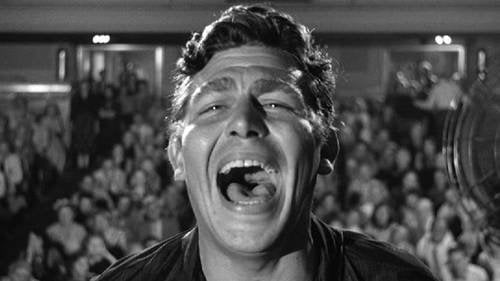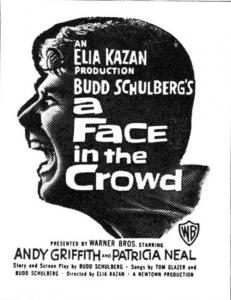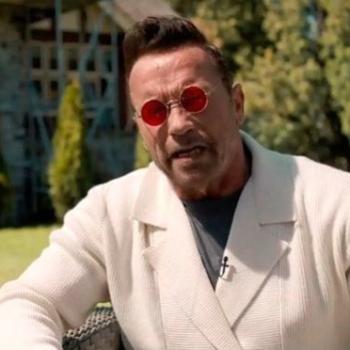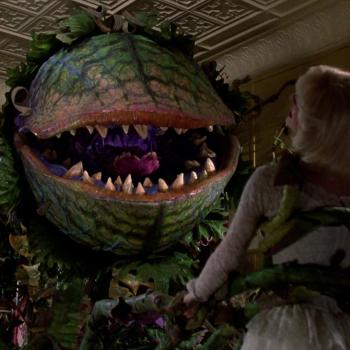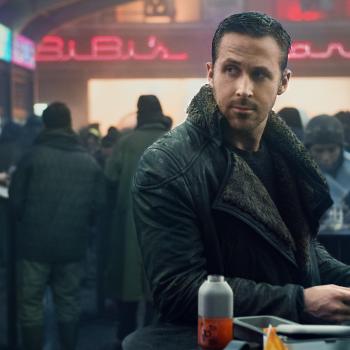This is a new weekly feature I’m going to be running here. I hope you enjoy it. A lot of these will be films I’m watching in grad school, but we’ll get some other movies in there too. Feel free to submit your picks as well in the comments, on my Facebook page (link below) or via email. I hope you enjoy this new addition!
This semester, I’m taking a class about depictions of journalism and politics in film. We’re only a few weeks in, but I’m enjoying it so far. We’ve watched a documentary about The New York Times and how it’s weathering the current change in journalism, and we’ve also watched “Citizen Kane,” which I hadn’t seen in nearly 20 years and has aged wonderfully. But few things have surprised me as much as the comment I made on Facebook following this week’s class:
Andy Griffith gives a beast of a performance in A FACE IN THE CROWD.
I’ve never thought it possible for Andy Griffith to give a “beast of a performance.” Griffith was Matlock. He was the genteel sheriff in his eponymous sitcom. He put out a CD of himself singing hymns, for crying out loud. When you hear his name, the automatic response is to hear whistling in your head, accompanied by images of him and Opie walking to the ol’ fishin’ hole. He was a nice guy. A gentle soul. He and “beast” never went together in the same sentence.
And yet, there he is in 1957’s A FACE IN THE CROWD as Lonesome Rhodes, cackling maniacally, stalking across the screen with a chilling smile and wild eyes, seducing women and pandering to a crowd that laps up his every word. When he does take to a TV screen as a good ol’ country boy, it’s lathered in cynicism and irony, a way to get the rubes to buy whatever position he’s pushing. Lonesome Rhodes, “the demagogue in denim,” is one of the great screen monsters, brought to life by one of the most electric performances I’ve seen.
Elia Kazan’s film turns 60 years old this year. The story of “Lonesome” Rhodes (Griffith), a scoundrel plucked from obscurity by radio host Marcia (Patricia Neal), it’s a tale of media influence and power that has only gotten more prescient with time. As Rhodes’ folksy charm wins over the country and turns him into one of the nation’s biggest celebrities, only a few see the way he’s using his yokel shtick and rollicking folk songs to seduce women, secure wealth and ultimately get a seat at the nation’s most influential tables. Marketers and CEOs try to harness Rhodes’ popularity to sell their products, but they’re not prepared for the way he throws off the shackles of sponsorship, refusing to hold the hands that feed him and sometimes nipping at them instead — unless, of course, they’re a fit with his brand (a thought that is decades ahead of its time). As the populace turns him into a hero and the voice of the nation, they don’t see the people he’s manipulating, the sneers he gives when he’s off camera or the way he wheedles himself into positions of power and influence.
The film was made several years after director Kazan and screenwriter Bud Schulberg testified before Senator Joseph McCarthy during the HUAC hearings. The fallout from those hearings, where both men provided names of Hollywood players possibly involved in Communism, followed them for years. They made A FACE IN THE CROWD with Rhodes a stand-in for McCarthy, a man who pretends to be for the people but who revealed himself only to be in pursuit of power and influence, undone once the public got a look at his true face. The film drips with cynicism; no one is left off the hook. Not the well-intentioned radio host who gives Rhodes his first public forum, not the CEOs who pander to the public to sell worthless vitamins and not the office boy who hitches his wagon to Rhodes’ train for his own benefit. In Kazan’s film, everyone is complicit in using the media to manipulate the public and push their agendas, and those who might be in a position to stop it — such as Walter Matthau’s reporter Mel — are too meek to speak up.
A FACE IN THE CROWD still feels immediate and dangerous 60 years on. It’s seductive and sweaty, matter-of-factly showing the sexual manipulation and politics between Rhodes and Marcia in a way that feels more forthright than I’d imagined a 1950s film could be. A flirtation between Rhodes and a young baton twirler, filmed only in glances across a crowded field, feels almost pornographic in its sexual charge. As the moral murkiness overtakes everyone, Kazan bathes the film in shadows and fills the screen with closeups; Rhodes’ bellowing laugh, initially an endearing every-guy tic, grows sinister and sadistic by the film’s end, often shot so tightly that we can see Griffith’s mouth and tongue quivering with each bray. Schulberg’s script pulls no punches, imagining an insane circus springing up around Rhodes in which he smooth talks his way into fortune and political power (it’s a film that’s only slightly less cynical than Billy Wilder’s ACE IN THE HOLE), and the dialogue crackles like an unholy marriage between screwball farce and film noir.
Neal gives a complex, heartreaking performance as Marcia. Is she an innocent seduced by Rhodes? A complicit partner? A jilted lover or willing accomplice? There’s a great deal going on and Neal plays it all with aplomb, creating a character who is well aware of her role in creating Lonesome Rhodes. She loves him but also feels handcuffed to him. She knows she’s the “shock absorber” for all his debauchery, as Mel puts it, but she can’t bring herself to walk away from him until she’s pushed to the brink. It’s fantastic work, and Marcia is the true tragic figure in this film. Matthau brings his world-weary charm and self-deprecating sweetness to the role. Years before he’d become famous for playing the scoundrel, here he’s the voice of reason and morality, albeit too smitten with Marcia and soft-spoken before the whirlwind that is Lonesome Rhodes to make much of a difference.
But it’s Griffith who dominates this film in a performance that oozes charisma and raw energy. That down-home charm that we’re so familiar with is only on display for a few scenes and in those moments it’s simply an ironic counterpoint to the duplicitous true nature of Rhodes. For the rest of the film, he stalks the stage, his eyes mad with wild-eyed intensity; he gets off on knowing that people love every word he says. When Lonesome’s on camera, he’s a man fully alive, powered by the attention he’s getting, jumping into action with an improvised song or rant. When the cameras are off and the doors are closed, his eyes darken. His words drip malice as he laughs about the sheep who follow him who are even “dumber than I am” and who he has to think for. The only time his guard is down is when he’s with Marcia. Then, he can turn into a quivering, scared boy, a deer in the headlights, overwhelmed by fame. But how much of that is genuine? How much is manipulation? Or is there truth to it all? It’s a performance that dares us to look away, delivered with the intensity I’ve only seen in a few other roles. I never suspected that it from the sheriff of Mayberry.
The film was mostly ignored upon its release, but it’s grown in estimation since. Much of that is because the cautionary tale of that time has turned into reality. It’s no longer surprising that someone could pander to the public to curry power or that the public would forgo political discussion and dialogue in favor of personalities and catch phrases; these days, it’s expected. Politicians are judged not on their positions but on their charisma and likability; whether or not we’d have a beer with them. People are willing to put their trust in spokespersons who say what no one else will and who will come off as “one of them” even though they have no intention of helping the public. But now, in the aftermath of the 2016 elections, Kazan’s film feels cynical but also slightly naive. After all, once Lonesome Rhodes was unmasked, the people turned on him. Last November, we elected him.

